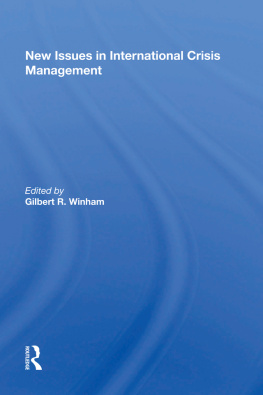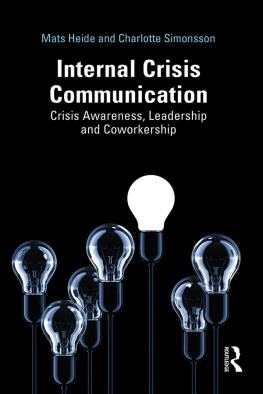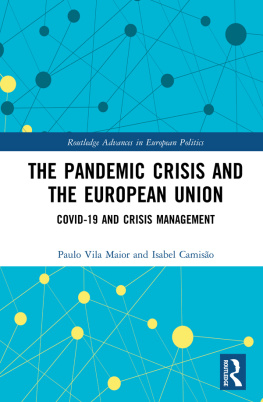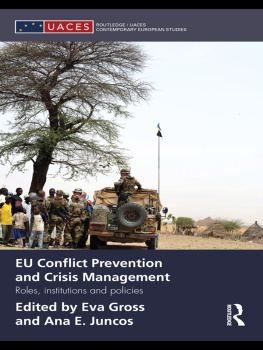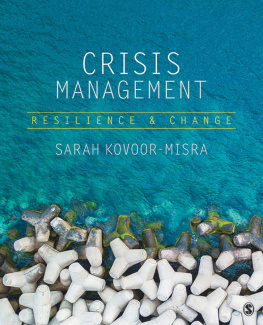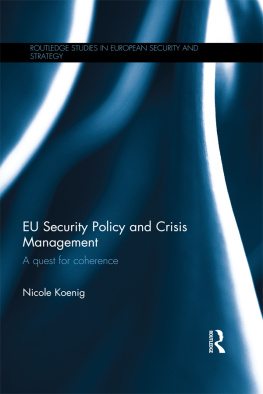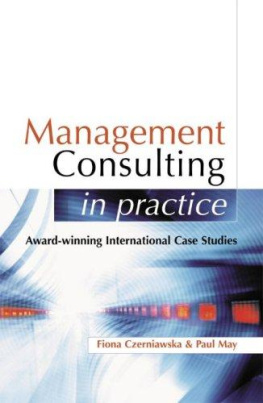New Issues in International Crisis Management
New Approaches to Peace and Security
Richard Ned Lebow , Series Editor
Increasing anxiety about conventional and nuclear war has triggered a corresponding interest in books that treat these themes. This burgeoning literature is largely descriptive and narrowly technical and often reflects a prodefense bias. This series, by contrast, will address broader theoretical and policy questions associated with conflict and conflict management. On the whole, its perspective is critical of conventional wisdom in the realm of both policy and theory. The overarching goal of the series is to help lay the intellectual foundations for alternative approaches to thinking about security.
Titles in This Series
New Issues in International Crisis Management, edited by Gilbert R. Winham
Arms Control and U.S.-German Relations, Gert Krell
About the Book and Editor
A comprehensive overview of the state of crisis management in international affairs, this book focuses primarily on the U.S.-USSR relationship. For most of the postwar period, the U.S. superiority in nuclear weapons shaped the political structure within which international crises occurred. This edge began to deteriorate by the late 1970s, leading to a new and potentially more dangerous structure within which the superpower rivalry is now conducted. Arguing that the shifting nuclear balance has created a new dimension for crisis management, the contributors analyze such issues as the informal norms of diplomatic behavior that have evolved during the extended superpower rivalry, the tendency of both superpowers to engage in activities that progressively reduce crisis stability, and various concrete measures such as risk reduction centers that might enhance the current system for crisis management. The book also includes case studies of crisis management among non-superpowers. Taken together, these papers address the important question of how human control can be maximized in situations of international crisis.
Cilbert R. Winham is professor and chairman of the Department of Political Science, Dalhousie University, and former director of the university's Centre for Foreign Policy Studies. He is the author of International Trade and the Tokyo Round Negotiation (1986) as well as other books and articles and is the coeditor (with Denis Stairs) of The Politics of Canada's Economic Relationship with the United States and Selected Problems in Formulating Foreign Economic Policy (both 1985).
New Issues in International Crisis Management
edited by
Gilbert R. Winham
First published 1988 by Westview Press
Published 2018 by Routledge
52 Vanderbilt Avenue, New York, NY 10017
2 Park Square, Milton Park, Abingdon, Oxon OX14 4RN
Routledge is an imprint of the Taylor & Francis Group, an informa business
Copyright 1988 by Taylor & Francis
All rights reserved. No part of this book may be reprinted or reproduced or utilised in any form or by any electronic, mechanical, or other means, now known or hereafter invented, including photocopying and recording, or in any information storage or retrieval system, without permission in writing from the publishers.
Notice:
Product or corporate names may be trademarks or registered trademarks, and are used only for identification and explanation without intent to infringe.
Library of Congress Cataloging-in-Publication Data
New issues in international crisis management.
(New approaches to peace and security)
Bibliography: p.
Includes index.
1. International relations. 2. Crisis management.
3. Nuclear crisis control. 4. United StatesForeign
relationsSoviet Union. 5. Soviet UnionForeign
relationsUnited States. I. Winham, Gilbert R.
II. Series.
JX1391.N49 1988 327.1'1 87-3452
ISBN 13: 978-0-367-01112-3 (hbk)
Contents
- PART ONE
THEORY AND PRACTICE - PART TWO
SUPERPOWER RELATIONS - PART THREE
NUCLEAR CRISIS MANAGEMENT - PART FOUR
CRISIS MANAGEMENT IN REGIONAL CONTEXT
- PART ONE
THEORY AND PRACTICE - PART TWO
SUPERPOWER RELATIONS - PART THREE
NUCLEAR CRISIS MANAGEMENT - PART FOUR
CRISIS MANAGEMENT IN REGIONAL CONTEXT
Guide
Crisis is a long-standing concern to scholars of international relations, and there is a substantial literature, both of the case study and theoretical variety, that deals with this subject. The diplomacy associated with crisis has an equally long-standing intellectual tradition. Much of diplomatic history, which can begin with a reading of the politics between warring Greek city-states recounted in Thucydides' Peloponnesian Wars, is an analysis of the exchanges between governments during periods of international tension and crisis.
Despite the fact that scholars have long been concerned about diplomacy during crisis, the sub-field of crisis management has had a short history. Essentially, crisis management is the practice of attempting to avoid an outcome in interstate relations that leads to violence or war, without abandoning at the same time one's position. This practice has become of increasing importance in international relations since World War II because the prospect of nuclear war has made violence a more costly mechanism for resolving conflict. Similarly the literature on crisis management has developed mainly since World War II and includes landmarks such as Buchan (1966), Bell (1971) and George et al. (1971), as well as an international collection of essays edited by Frei (1978), A lively journal literature now exists on this subject and has been reviewed by Tanter (1975) and Gilbert and Lauren (1980).
In preparing for its XIIIth World Congress in Paris in July 1985, the International Political Science Association established a section entitled "New Forms of Crisis Management" under the direction of G. R. Winham of Canada and A. Yakovlev of the USSR. The focus of this section was on crisis management between the superpowers, which is the area of greatest concern from the perspective of world security. Other selected aspects of crisis management outside the main lines of East-West confrontation were also included. The academic papers presented at the IPSA World Congress in Paris served as the catalyst for this edited volume.
This book could not have been completed without the assistance of others. The editor wishes to thank the contributors to this volume, as well as those who participated at the 1985 IPSA meeting. Financial support for this volume was received from Professor Robert Boardman, director of the Centre for Foreign Policy Studies at Dalhousie University, and from the Faculty of Graduate Studies at that university. The administrative work associated with the IPSA meeting was carried out by Mrs. Doris Boyle, former secretary to the centre. Nina Winham edited the papers and the final manuscript and prepared the bibliography and index. The arduous tasks of typing and coding the final manuscript were cheerfully accomplished by Paulette Chiasson, administrative secretary to the Department of Political Science. To these people I owe an enormous debt of gratitude.
Gilbert R. Winham
Halifax, Nova Scotia
New Issues in International Crisis Management
Introduction
Gilbert R. Winham
In 435 B.C. the Greek city of Epidamnus, a colony of Corcyra suffering internal unrest and external hostilities, appealed for military assistance from its mother country. It was rebuffed. It took its case to Corinth; and the Corinthians, motivated in part by hatred of Corcyra, which was in turn a colony of Corinth, agreed to come to the assistance of Epidamnus. The Corcyreans reacted violently to this action, and hostilities commenced between Corinth and Corcyra.


